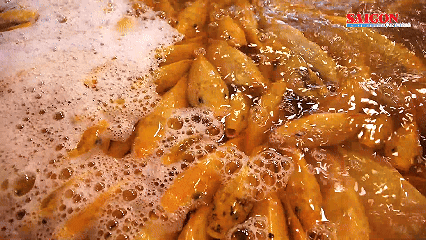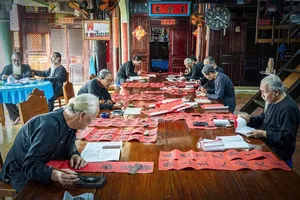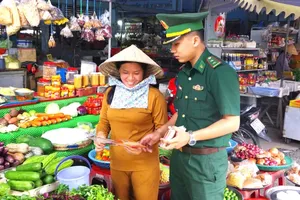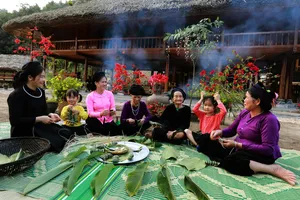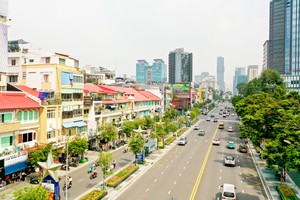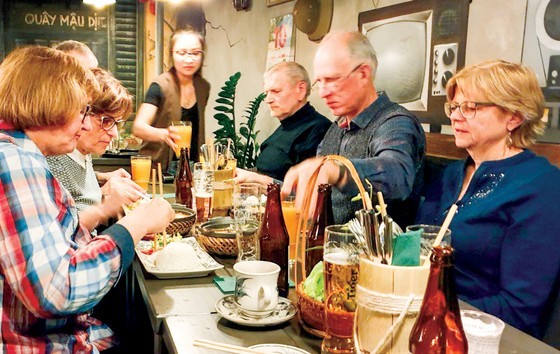 |
Many German enjoy Vietnamese food at a restaurant owned by Vietnamese people |
Many restaurants and eateries with Vietnamese names sell Vietnamese dishes including pho, vermicelli, rice or spring rolls, fried spring rolls, and even porridge with animal organs are sold all over Germany. Vietnamese cuisine has made a remarkable mark in their popularity in the food service industry in Germany.
The Vietnamese community in Germany is a minority migrant community with about 185,000 people out of a total of 84.4 million Germans. Most Vietnamese people came to Germany in the German Democratic Republic (usually abbreviated GDR) by labor export and vocational training. Many Vietnamese people in Germany opened restaurants, and retail stores selling clothing, food, vegetables and fruits, and other service industries such as nails, massage, and beauty.
In the early 2000s, Chinese restaurants dominated the market, many Vietnamese were selling Chinese or Thai dishes because they were not confident about selling Vietnamese dishes; nevertheless, Vietnamese cuisine with dishes mainly made from rice has become a trend in Germany. Vietnamese specialties including spring rolls, fried spring rolls, beef noodle soup, and chicken noodle soup have become favorite dishes in the second-most populous country in Europe.
One can order Vietnamese food to take home after shopping in the mall or others can sit on the sidewalk drinking beer 333 just like in Vietnam and order a piece of bun cha, or they can also order a portion of rice and braised meat with filter coffee via a delivery app.
Vietnamese shops are seen everywhere in all 16 German states and are most concentrated in Berlin with about 200 shops, also because approximately 20,000 Vietnamese people are living in Berlin followed by other big cities such as Munich, Hamburg, and Frankfurt am Main.
Low-fat Vietnamese dishes skillfully combine ingredients from rice, vegetables, meat, fish, shrimp and tropical herbs, bringing a feeling of refreshment when eating, and lightness after eating. The dishes made from fruits such as mango salad, papaya salad, pomelo salad, and braised banana also bring an irresistible uniqueness.
Local diners excitedly said that they did not imagine how fruits are delicious when they turned to be vegetables in Vietnamese dishes until they ate dishes. Each diner is loyal to a Vietnamese restaurant and usually orders a certain dish on fixed days of the week. This customary habit of the Germans has been recognized by Vietnamese restaurant owners, even Vietnamese owners of a restaurant will give customers ‘nicknames’ according to the dish code they usually order.
Many German diners said that their taste of spicy food have increased after years of enjoying dishes with chili sauce and fresh chili at Vietnamese restaurants. Their skills of holding chopsticks are so good that they can even pick up a sesame seed. Fish sauce is also a popular sauce even in German homes.
Nowadays, ingredients to cook Vietnamese dishes are easily found in Germany, even in German supermarket chains. Asian dishes are so popular that many supermarkets have large shelves full of noodles, vermicelli, pho noodles, rice paper for making spring rolls, fish sauce, green beans, shiitake mushrooms, and fungus.
Vietnamese restaurants in Germany have been also shortening the list of dishes on the menu. Many restaurant owners, especially young people of the generation born and raised in Germany, choose the Fusion style - a form of cooking that combines contrasting culinary traditions or techniques into a single dish. There are many Vietnamese restaurants in Germany, but not many chefs are high-ranking because most Vietnamese restaurant owners who switch to selling restaurants are not properly trained, so the quality of the dishes is not as good as expected; plus, they try to attract customers by lowering prices, using ingredients according to customers' wishes, so they gradually lose their identity.
The most popular are The Duc Ngo and Monsieur Vuong, ranked by Michelin in the top 80 best restaurants in Berlin. The Chef of The Duc Ngo restaurant is famous on German television in several culinary programs and with a chain of 14 restaurants in several major German cities. At the age of five, the 1974-born chef came to Germany and is now one of the most successful Vietnamese in the restaurant industry.
The food and beverage industry after the Covid-19 pandemic had a severe shortage of workers. That is why, over the past time, Germany has received thousands of Vietnamese students to learn the kitchen and hotel profession. An apprentice will have a salary of around €1,000 before tax and they necessarily study and work for 2 years at a registered institution before going to Germany with a B1 level German. However, Germany is always lacking skilled chefs.



